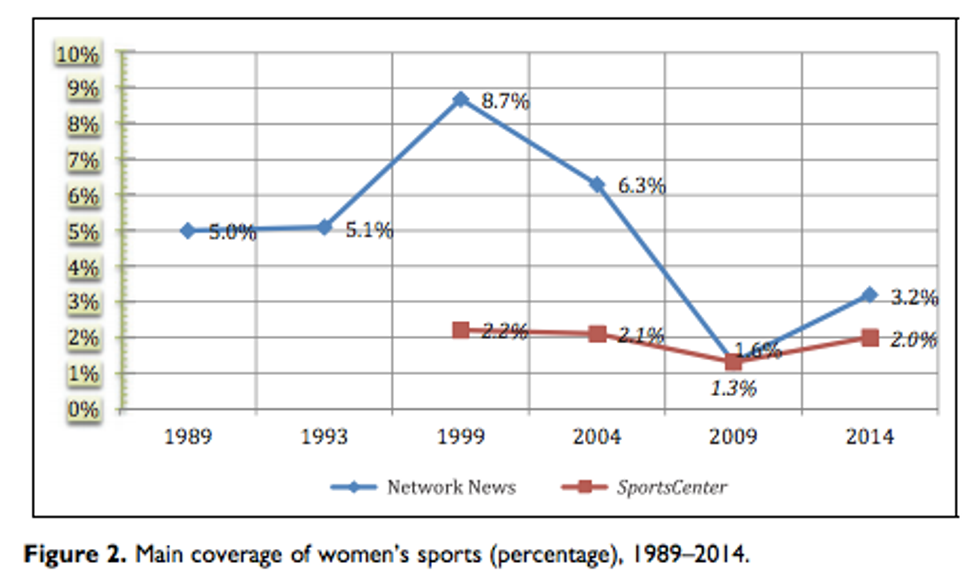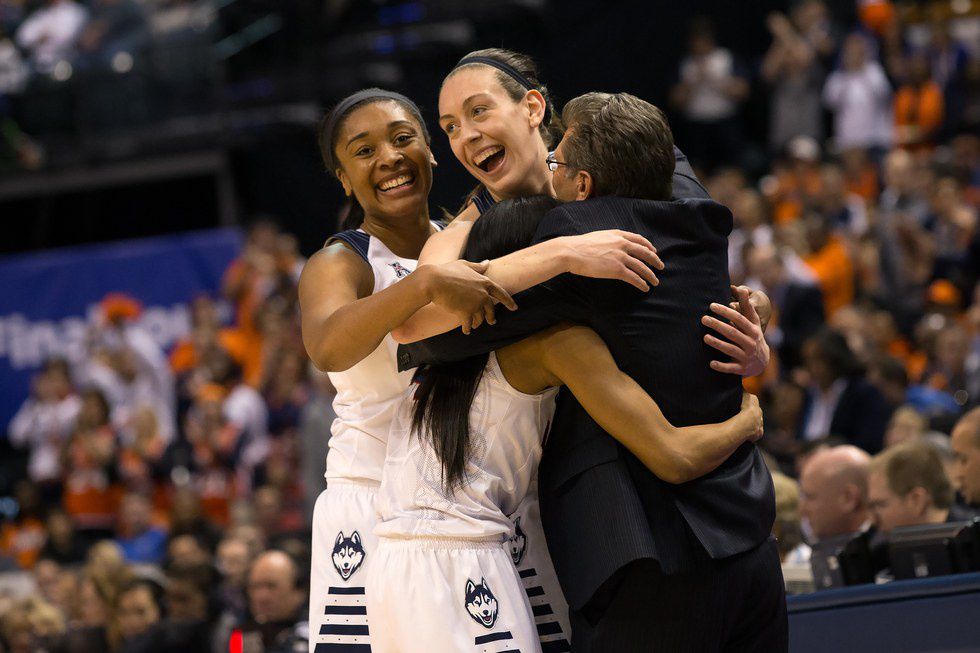Men’s sports are without a doubt considered by most more entertaining when compared to women’s sports. Typically, many view men’s games as more fast-paced and exciting than women's; often, men's events include exciting displays of athleticism, such as dunking, that are less common in women’s events. However, this does not take away from the skill and athleticism or hard work and dedication that is required for females to succeed as athletes. Comments referring to women's sports as a joke are woefully ignorant and sexist remarks that should have no place in society.
The passing of Title IX in 1972 opened up more opportunity for women to participate in sports. Title IX states, "No person in the United States shall, on the basis of sex, be excluded from participation in, be denied the benefits of, or be subjected to discrimination under any education program or activity receiving Federal financial assistance." Over the past 40 years, increasing numbers of women are participating in athletics. However, despite these strides, there is still an extreme lack of coverage, huge wage differences, and worst, backlash against the validity of women's sports.
Men’s sports are much more widely covered than women’s sports. A study called “It’s Dude Time!” examines the coverage of women’s sports by the media. The most recent update of the study reports that in 2014, SportsCenter gave 2 percent of airtime to female sports, a number that has stayed about the same since 1999.
The 2014 Women’s World Cup was watched by a record number of viewers. FIFA reported that “US broadcaster Fox Sports 1 attracted 3.3 million viewers to the game between the United States and Australia, more than three times higher than Team USA’s first group stage match in 2011.” This rise in viewership tells us that more people are watching women’s sports—so shouldn’t it make sense for there to be more coverage of women’s sports? There should not be such a mismatch between a growing audience and coverage that fails to grow with it.
The report also notes that coverage for men’s sports differs from coverage of women’s sports, saying in the abstract that, “The analysis highlights a stark contrast between the exciting, amplified delivery of stories about men’s sports, and the often dull, matter-of-fact delivery of women’s sports stories.” Commentary for men’s sports is fast-paced and enthusiastic, generating excitement and entertainment while watching. However, women’s sports are covered in a very “matter-of-fact” way, lacking the excitement and pace of men’s coverage.
In addition to lack of coverage, female athletes have less professional opportunities and get paid significantly less than male athletes. WNBA players have to play abroad in Europe or Asia in the off season to sustain a good income. In 2014, the maximum salary for a season for one player was about $107,000. Compare that to the NBA league minimum of $490,180. Diana Turasi, arguably the best women’s player in the world, made in one WNBA season less than a fourth of what some rookies and first-time NBA players make in what could be very few minutes of actual playing time.
Earlier this year, well-known members of the U.S. Women’s soccer team (Hope Solo, Carli Lloyd, Becky Sauerbrunn, Alex Morgan, Megan Rapinoe) filed a complaint against U.S. Soccer for wage discrimination, noting that despite their success, they get paid significantly less than the not-so-successful men’s team. For instance, women get a $1,350 bonus for winning a friendly match, whereas men make at least $5,000 for each friendly, which can be bumped up to $17,625, depending on result and opponent ranking.
Aside from minimal coverage and extreme disparities in pay and opportunity, what is even worse is how so many people will go out of their way to bash women’s sports and degrade female athletes. Recently, the University of Connecticut’s women’s basketball team won its fourth national championship in a row, with Breanna Stewart being the first Division I player—male or female—to win Final Four MVP four times. Despite these incredible accomplishments, posts about the event by sports media on Instagram were littered with comments attacking Stewart’s appearance, disregarding her accomplishments and talents, and attacking women's sports in general.
In a press conference prior to this year's Final Four, UConn coach Geno Auriemma commented on the bias against women's sports, saying, "because we're in the news when we do something, and we're thrown out there against a lot of people's wishes, it's as if it's our fault; or that the women's game is not a sport, that it's a joke." He continued, "And for those out there who don't appreciate it, that's fine, I'm not asking you to. But don't demean those who do appreciate it, that's all."If you don’t find women’s sports entertaining, there is a simple solution: don’t watch. It’s not that hard to avoid watching, considering the amount of coverage women's sports get. However, there is no reason to go out of your way to insult female athletes, whose skill, talent, devotion, sacrifice, and effort is of no less value than that of male athletes.













































